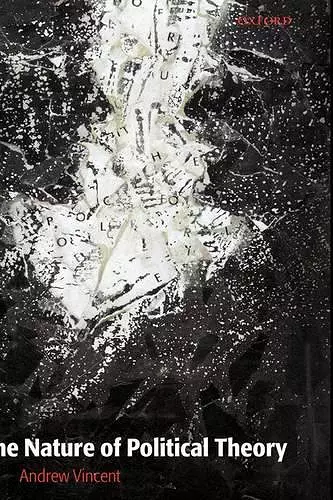The Nature of Political Theory
Format:Hardback
Publisher:Oxford University Press
Published:25th Mar '04
Currently unavailable, and unfortunately no date known when it will be back
This hardback is available in another edition too:
- Paperback£59.00(9780199297955)

Winner: W. J. M. Mackenzie Book Prize
Offers a comprehensive, synoptic, and comparative analysis of the major conceptions of political theory throughout the twentieth century. This book challenges established views of contemporary political theory and provides perspectives on the future of the subject. It is intended for various scholars and students of the discipline.The Nature of Political Theory is a controversial book which challenges the established nostrums of contemporary political theory. Its major contributions to current scholarship are threefold. It offers, first, a comprehensive, synoptic, and comparative analysis of the major conceptions of political theory, predominantly during the twentieth century. This analysis incorporates systematic critiques of both Anglo-American and continental contributions. The 'nature' of theory is seen as intrinsically pluralistic and internally divided. Secondly, the idea of foundationalism is employed in the book to bring some coherence to this internally complex and fragmented practice. The book consequently focuses on the various foundational concerns embedded within conceptions of political theory. The third major contribution of the book is to argue for an adjustment in the way we think about the discipline. Political theory is reconceived as a rhetorically-based, indeterminate subject, which should be more attuned to practice and history. Overall, the book makes a case for a more ecumenical and tolerant demeanor, suggesting that there are different, but still quite legitimate, answers to the question, 'what is political theory?'. Acceptance of this view would involve a supplementation of the standard substantive approaches to contemporary political theory. Students of politics should minimally be made aware of the deeply contested character of the discipline during the twentieth century. The book therefore challenges the way we think about political theory as a subject. The book can consequently be read on two levels. First, there are systematic concise expositions of distinct movements and arguments which have characterized the various phases of political theory during the twentieth century. Secondly, there is a deeper argument, which moves through the whole text, focusing on the theme of foundationalism. This latter theme embodies the contention that we should rethink the manner in which we configure political theory. As such, the book offers a unique and idiosyncratic perspective on our current understanding of political theory.
This book offers a comprehensive overview of the major strands of contemporary political theory and presents a case for the importance of metaphysics to the study of politics. * Times Higher Education Supplement *
- Winner of Winner of the 2004 W. J. M. Mackenzie Prize awarded by the Political Studies Association.
ISBN: 9780199271252
Dimensions: 241mm x 162mm x 24mm
Weight: 657g
366 pages